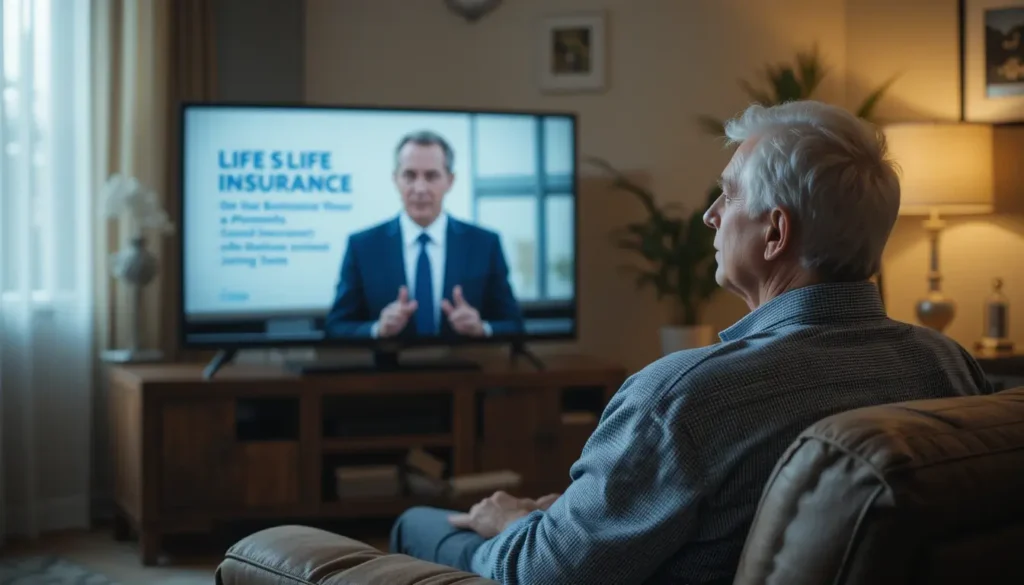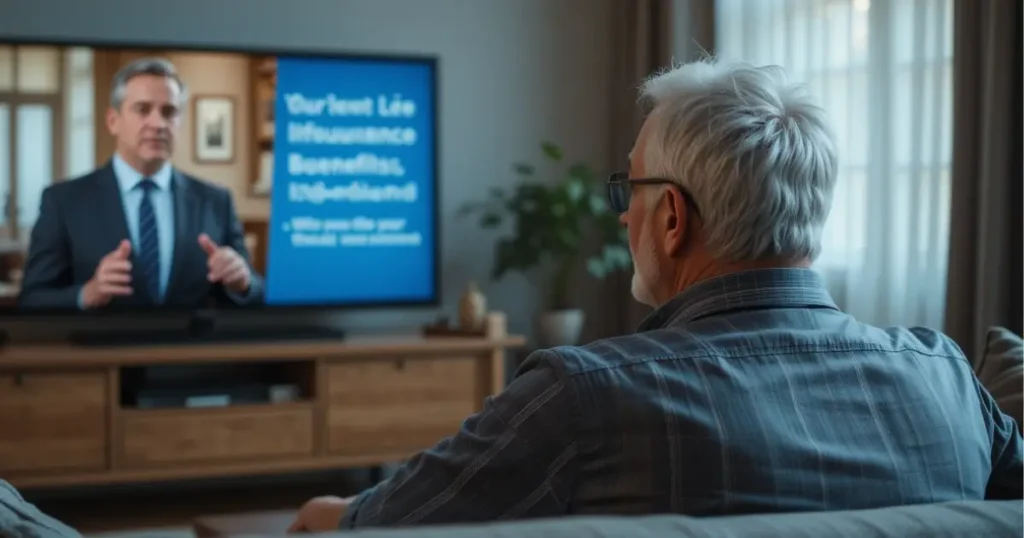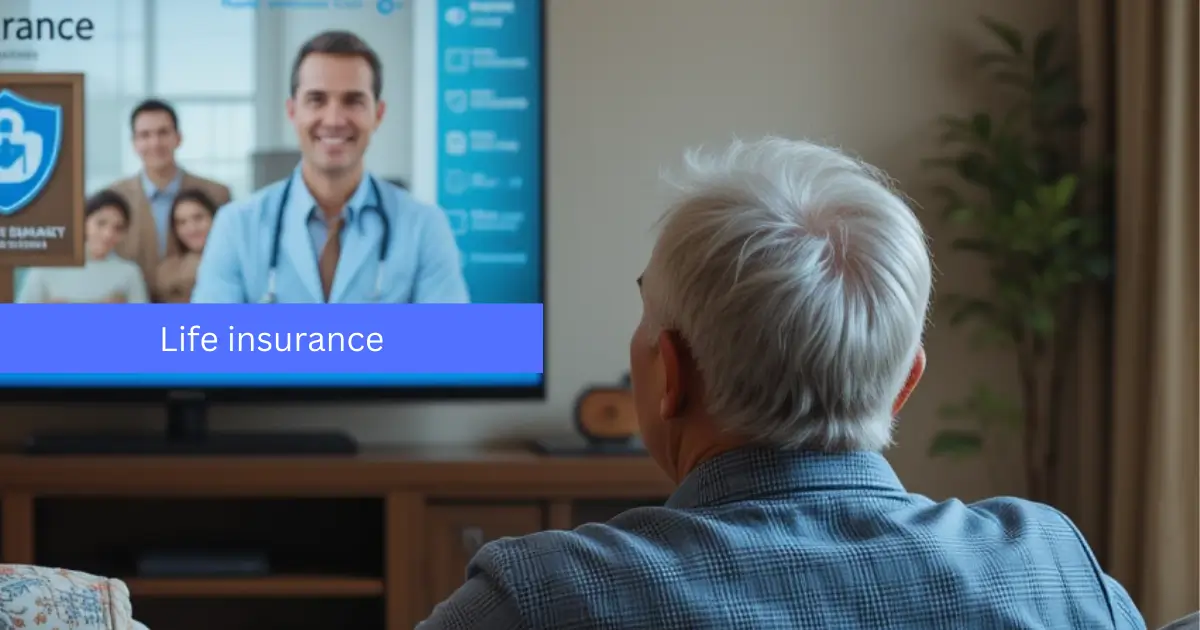Seniors in the United States see many TV ads for life insurance. These ads promise affordable plans with easy sign-ups and guaranteed acceptance. But are these deals really good, or do they have hidden dangers?
It’s important to understand the details of these TV life insurance offers. These ads aim at seniors, promising financial security. They use emotional stories and fast approval claims to grab attention.
Your financial safety is key. It’s vital to carefully look at these insurance deals. This guide will help you see the truth behind TV insurance ads. It aims to help you make wise choices about your coverage.
Table of Contents
Key Takeaways
- TV insurance ads target seniors with appealing marketing strategies
- Not all television-advertised policies offer comprehensive coverage
- Understanding policy details is critical before enrollment
- Compare multiple insurance options beyond TV advertisements
- Consult professional insurance advisors for personalized guidance
Understanding Senior Life Insurance As Seen on TV
Television has changed how senior life insurance is promoted. Senior life insurance company tv commercials now use smart strategies. They grab the attention of older Americans with messages that touch their hearts.
Today’s insurance ads tell stories that speak to seniors’ worries about money and leaving a legacy. The senior life insurance tv spokesman is key in building trust. They help make potential customers feel secure.
Television’s Impact on Insurance Marketing
TV ads have changed how insurance is sold. They focus on features that seniors find important:
- Guaranteed acceptance policies
- No medical exam requirements
- Quick application processes
- Immediate coverage options
Key Policy Features for Seniors
Senior life insurance policies often come with:
- Simplified underwriting with few health questions
- Flexible ways to pay premiums
- Death benefits for final expenses
- Potential to grow cash value
Targeting the Right Audience
Insurance companies aim their ads at seniors aged 60-85. These ads talk about funeral costs, debt, and supporting loved ones financially.
By knowing who watches and what moves them, senior life insurance tv spokesmen craft stories. These stories make complex insurance ideas easier to grasp.
The Reality Behind TV Insurance Marketing Claims
When you see a senior life insurance company on TV, the ads seem very appealing. They promise low monthly payments and guaranteed acceptance. But what’s really behind these claims?
TV insurance ads often use tricks to attract seniors. They focus on:
- Simplified application processes
- No medical exam requirements
- Immediate coverage options
- Seemingly affordable monthly rates
The truth is far from the TV ads. Many policies have big limitations that aren’t clear at first. For example, some term life insurance for seniors might have:
- Restricted death benefit amounts
- Higher premium rates than usual
- Strict age and health rules
- Potential waiting periods for full coverage
Don’t just believe what you see on TV. Always read the fine print and ask questions about the policy. Knowing all the details will help you choose the right life insurance.
Comparing Senior Life Insurance TV Offers to Traditional Policies

Finding the right term life insurance over 65 can be tough. TV ads and traditional policies offer different ways to protect your finances. Knowing the differences helps you choose wisely.
Looking at term life insurance over 60 shows big differences in how policies work and how to apply.
Cost Analysis and Premium Differences
TV ads might make insurance seem cheaper at first. The main price differences are:
- Simplified underwriting processes
- Shorter coverage periods
- Lower initial premium rates
- Age-specific pricing strategies
Coverage Limitations and Benefits
Traditional policies usually give more complete coverage. Your benefits can change based on:
- Medical exam requirements
- Total coverage amount
- Potential policy exclusions
- Renewal options
Application Process Comparison
TV-advertised policies often have streamlined applications. Traditional insurers need more health info. Your choice depends on your health and how much coverage you want.
Compare term life insurance rates over 60 from different companies to find the best fit for you.
Hidden Costs and Fine Print in TV-Advertised Senior Policies
Exploring senior life term insurance on TV requires a close look at hidden details. Many seniors are surprised by unexpected costs and policy limits. These surprises often come from policies they saw during commercials.
Insurance plans advertised on TV can have complex financial structures. Senior life insurance reviews often point out key things to consider. These are important for potential buyers to look at carefully.
Premium Increase Schedules
Your policy might start with a good rate, but costs can change a lot over time. Important things to think about include:
- Potential annual rate increases
- Age-based premium adjustments
- Unexpected fee structures
Coverage Exclusions and Waiting Periods
Not all policies offer full coverage right away. Many senior life insurance plans have specific restrictions:
- Waiting periods before full benefits activate
- Health condition limitations
- Specific circumstances where claims might be denied
Policy Rider Considerations
Optional policy riders can improve your coverage but add extra costs. Carefully review each potential rider’s details to understand its value and impact on your insurance plan.
Always read the complete policy documentation and ask detailed questions before committing to any senior life insurance plan advertised on television.
Evaluating Insurance Rates for Seniors Over 65
Finding the right term life insurance for seniors over 65 can be tough. Seniors looking for life insurance face special challenges. Rates and what you need to qualify change a lot based on different factors.
To understand how rates are set, look at a few important things:
- Age-specific pricing structures
- Individual health status
- Desired coverage amount
- Policy type selection
Age-Based Premium Calculations
As you get older, insurance costs go up. For those over 65, this means paying more each month. Every year after 65 can add 5-10% to your premium. Your health and how much coverage you want also play a big role.
Health Qualification Requirements
Insurance companies check your health closely for seniors. Your medical history, current health, and lifestyle affect your eligibility and rates. Some TV ads promise easier health checks, which might mean less strict medical tests.
Payment Plan Options
There are ways to make your insurance payments easier to handle. Think about:
- Annual lump-sum payments
- Semi-annual installments
- Quarterly payment plans
- Monthly premium options
Choosing the right payment plan can help lower your costs. It keeps your coverage strong.
Alternatives to TV-Advertised Senior Life Insurance
Looking into other options for term life insurance over 60 can lead to better and cheaper coverage. TV ads might seem easy, but they don’t always show the whole story of what you need.
When you’re searching for term life insurance over 60, there are many good alternatives:
Traditional Insurance Products
Insurance companies have special policies for seniors. These policies usually offer:
- More flexible coverage options
- Potentially lower premium rates
- Comprehensive medical underwriting
Local Insurance Agent Expertise
Talking to a local insurance agent can give you personalized advice for term life insurance over 60. Agents can help you:
- Compare different policy options
- Understand complex policy details
- Find coverage that fits your health needs
Online Insurance Marketplaces
Online platforms have changed how seniors find term life insurance over 60. These sites offer:
- Quick comparison of multiple providers
- Instant online quotes
- Easy application processes
By looking into these alternatives, you can make a better choice for your life insurance. You might also save money compared to what TV ads offer.
Making an Informed Decision About Senior Life Coverage

Choosing the right senior life insurance is more than just watching TV ads. You need to look beyond the TV spokesman’s words. It’s important to understand what’s really being offered.
First, think about your financial situation. Look at these key points:
- Current financial obligations
- Existing savings and assets
- Potential funeral and end-of-life expenses
- Family’s financial needs after your passing
Don’t let celebrity endorsements sway you. Research matters more than marketing. Take time to compare different insurance options. Look at:
- Premium costs
- Coverage amounts
- Policy exclusions
- Waiting periods
Get advice from a licensed insurance professional. They can give you advice that fits your needs. They’ll help you understand senior life insurance better.
The best policy isn’t always the one with the most memorable TV commercial. It’s the one that offers the right protection at a price you can afford.
Conclusion: Is Senior Life Insurance As Seen on TV Right for You?
Exploring senior life insurance on TV can be confusing. These ads seem to offer easy solutions, but your needs are unique. Each company’s pitch looks good, but it’s key to look beyond the surface.
Choosing the right insurance is a big deal. Not every policy fits your health, budget, or needs. Look beyond the ads by comparing policies, reading the fine print, and thinking about your future.
Getting help from experts can make a big difference. Talk to independent agents who give unbiased advice. They can explain complex terms and point out hidden costs that ads might miss.
Your ideal insurance plan depends on your personal situation. Do your homework, ask questions, and compare options carefully. Your financial well-being is more important than a catchy TV ad.
FAQ
Are senior life insurance policies advertised on TV legitimate?
Yes, these policies are real. They are made for people over 60 who can’t get regular life insurance. But, you should check the policy details and what it covers before you decide.
How do TV-advertised senior life insurance rates compare to traditional policies?
TV policies usually cost more than regular term life insurance for seniors. They might be easier to get and don’t need medical exams. But, they often cost more each month. It’s important to look at the costs over time.
What are the typical age requirements for these TV-advertised senior life insurance policies?
These policies usually target people between 50 and 85 years old. Some are for those over 60 or 65. They promise easy acceptance with no medical exam. But, the exact age range can change based on the company and policy.
Do these TV-advertised policies require a medical exam?
Most of these policies don’t need a medical exam. This makes it easier for seniors with health issues to get coverage. But, they often cost more and might offer less coverage than regular policies.
What should I look out for in the fine print of TV-advertised senior life insurance?
Look closely at the fine print. Check for premium increases, what’s not covered, waiting periods, and any limits on payouts. Also, see if the policy has a graded death benefit, which might limit full coverage early on.
Are celebrity spokespeople a reliable indicator of a good insurance policy?
No, don’t rely on celebrity endorsements. While they can make a policy seem better, they’re just paid actors. Always do your own research and compare different options.
Can I get senior life insurance if I have pre-existing health conditions?
Yes, many policies are for people with health issues. They don’t need medical exams and are more flexible. But, this means they might cost more and offer less coverage.
How do I know if a TV-advertised senior life insurance policy is right for me?
Think about what you need. Consider your finances, debts, and what you want to leave behind. Look at different policies, read reviews, and talk to an advisor. Think about the cost, coverage, and the company’s financial health.

